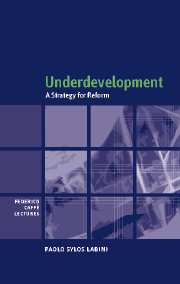Book contents
- Frontmatter
- Contents
- List of figures and tables
- Introduction
- 1 Economic development in a secular perspective
- 2 Culture, institutions and resources
- 3 The inadequacy of mainstream economics to explain development processes: returns and prices
- 4 The inadequacy of mainstream economics to explain development processes: distribution and growth
- 5 Economic relations between developed and underdeveloped countries
- 6 Demographic pressure and the countries of increasing poverty
- 7 Dependent workers, employment and unemployment
- 8 Organizational and institutional innovations
- 9 The problem of corruption
- Conclusion: a strategy for reform
- Bibliography
- Index
4 - The inadequacy of mainstream economics to explain development processes: distribution and growth
Published online by Cambridge University Press: 22 September 2009
- Frontmatter
- Contents
- List of figures and tables
- Introduction
- 1 Economic development in a secular perspective
- 2 Culture, institutions and resources
- 3 The inadequacy of mainstream economics to explain development processes: returns and prices
- 4 The inadequacy of mainstream economics to explain development processes: distribution and growth
- 5 Economic relations between developed and underdeveloped countries
- 6 Demographic pressure and the countries of increasing poverty
- 7 Dependent workers, employment and unemployment
- 8 Organizational and institutional innovations
- 9 The problem of corruption
- Conclusion: a strategy for reform
- Bibliography
- Index
Summary
The ‘price of capital’
Neoclassical economists consider ‘capital’ as an aggregate quantity that can be measured independently from income distribution, and the rate of interest as its ‘price’. This is wrong: ‘capital’ cannot be measured in that way (compare Harcourt, 1972) and the rate of interest, as Schumpeter pointed out long ago (1934 [1911]), is the price of the loans needed by firms to buy all the means of production, both durable and non-durable capital goods and those constituting the so-called ‘circulating capital’ – not only intermediate goods, raw materials and energy, but also the services of labour. It is true that durable capital goods – say, machines – require a long period (several years) before the sums of money that have been expended to purchase them can be recouped, whereas those spent on non-durable capital goods and for wages will be recouped in a shorter period (a year or so); it is also true that the interest rate for long-term loans seldom coincides with the short-term rate. As a consequence, a variation of the rates of interest is likely to modify the profitability of the use of the different factors of production and therefore modify the composition of demand of these factors. But we cannot predict whether an increase in the interest rate will reduce the demand for machines relatively to that of labour.
- Type
- Chapter
- Information
- UnderdevelopmentA Strategy for Reform, pp. 78 - 95Publisher: Cambridge University PressPrint publication year: 2001



